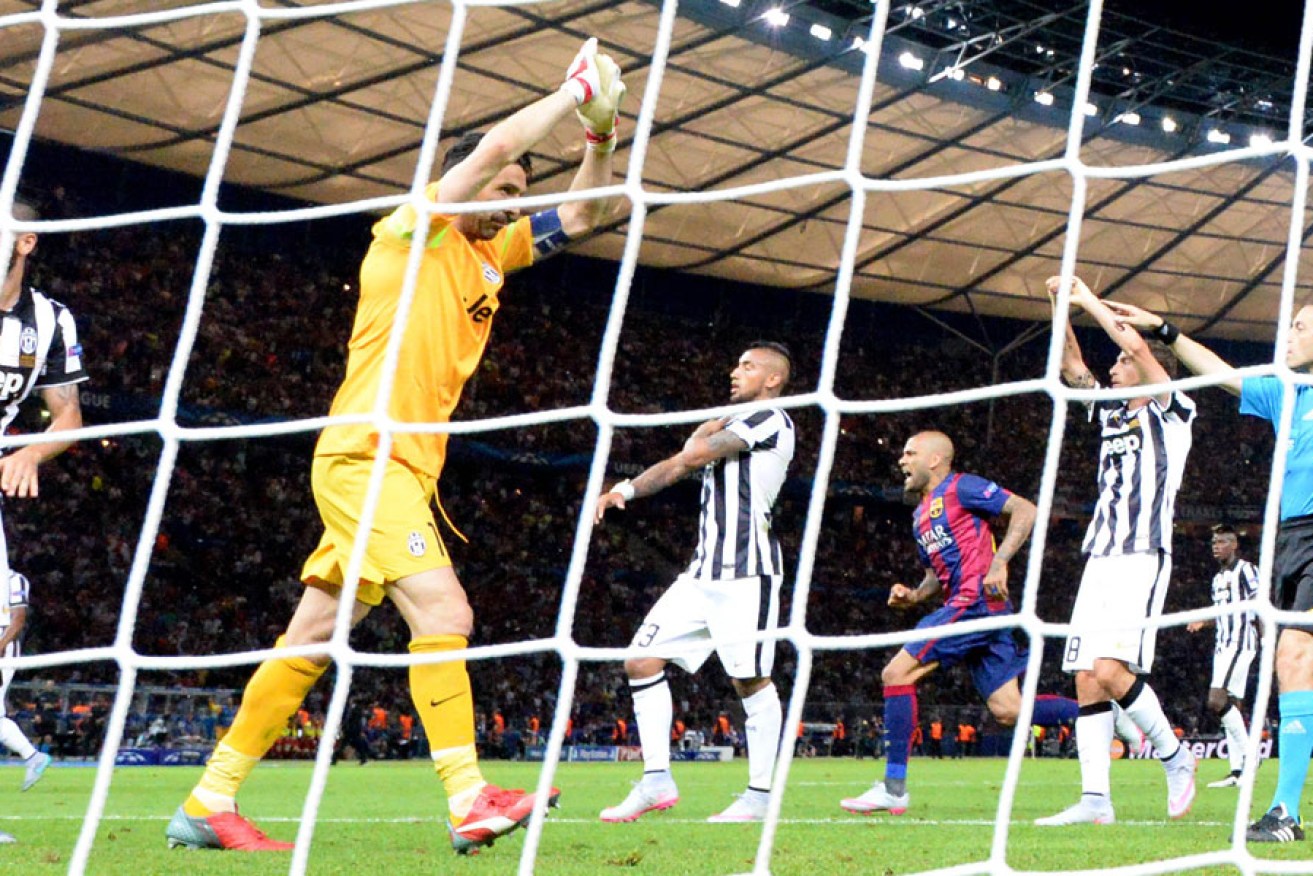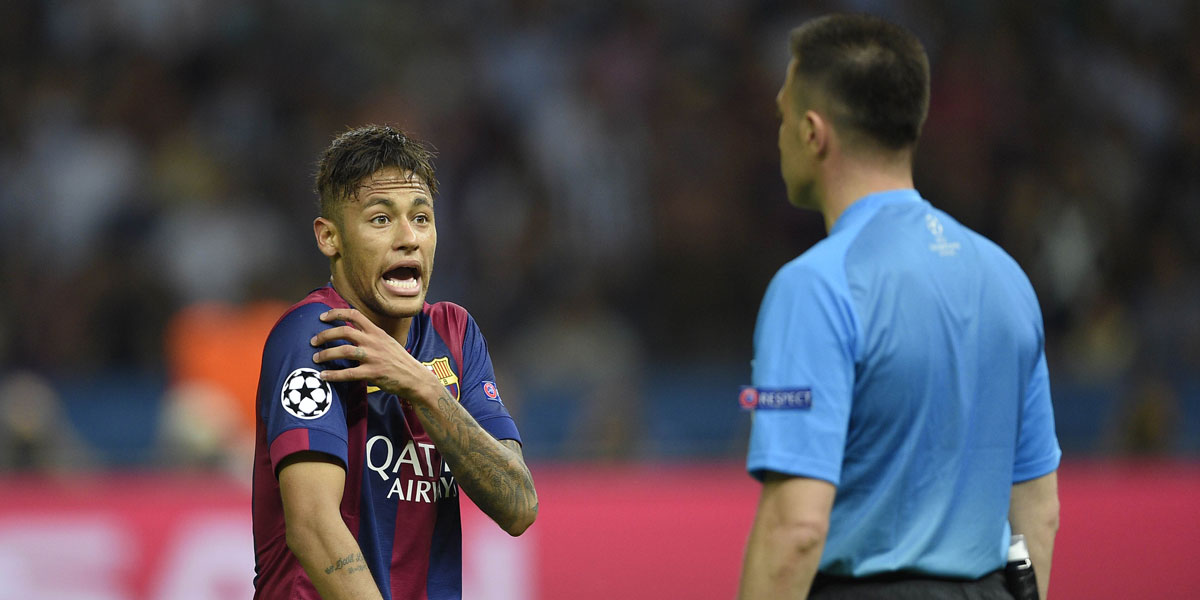Soccer’s most wrongly applied law

Juventus players claim handball after Barcelona's forward Neymar hit the back of the net during the recent UEFA Champions League Final. AFP photo
A few years ago, the team I play for was 2-0 down in a difficult match with only two or three minutes left.
Despite having little time to score the goals we needed to at least draw the game, we kept trying to push forward. You never know.
One of our wingers found space to cross the ball so I ran towards the far post to get in a position where I could meet his cross and score.
His delivery was brilliant: quick, curling away from the opposition goalkeeper and heading my way. Then it was up to me to volley the ball home.
Except the goalkeeper managed to get a slight touch on the ball, enough to divert its path. I was a short distance away so there was no time to react. From the keeper’s deflection, the ball hit my arm.
Then, though it didn’t happen in the way I’d intended, the ball went into the back of the net.
There was no need to look around to see the referee’s decision. I could hear from our opponents’ complaints that he’d given the goal.
“Handball, ref! That was handball!”
We couldn’t score a second so we lost the game and there were no more complaints after the final whistle. But even a few of my teammates were bemused.
“Lad got ‘way with one there, gaffer.” (Translation: “Paul was somewhat fortunate to be awarded that goal, coach.”)
In the spirit of fair play, should I have admitted the ball struck my arm?
No.
Firstly, I was sure the referee had seen it as he was well placed. Secondly (and this may be news to a lot of soccer fans), he made the correct decision.
So much nonsense is written and said about the handball offence that players and supporters are confused about its application.
Even many referees, who should have an encyclopedic knowledge of the laws, either don’t understand when they should or shouldn’t give a free kick against a player who has handled the ball or they’re making the wrong call because they’ve been influenced by these ill-informed handball debates.
Our sport has just 17 laws and Law 12 covers “fouls and misconduct”. This is what it says about handling the ball:
“A direct free kick is … awarded to the opposing team if a player … handles the ball deliberately (except for the goalkeeper within his own penalty area).”
And… that’s it.
Yes, that’s really it. There is nothing about whether the ball falls to a player’s advantage. The latest absurdity in handball discussions – whether the arm is in an “unnatural position” – isn’t mentioned either.
(Former England international Gary Lineker addressed this brilliantly in a handball debate earlier this year. Lineker, now a broadcaster, wrote: “This unnatural position of the arm talk is odd. The arm would only be in an unnatural position if it were not attached to the shoulder, no?”)
But, you may ask, surely a goal can’t result after a player from the attacking team handles the ball, even if it wasn’t deliberate?
It can. This is the law about scoring a goal:
“A goal is scored when the whole of the ball passes over the goal line, between the goalposts and under the crossbar, provided that no infringement of the Laws of the Game has been committed previously by the team scoring the goal.”
As Law 12 establishes, a handball that isn’t deliberate isn’t an “infringement”.
The recent UEFA Champions League final between Juventus and Barcelona sparked another round of handball argument.
In the first half, a cross by Barcelona’s Neymar struck the left hand of Juventus defender Stephan Lichtsteiner. As Lichtsteiner was in the 18-yard box, a penalty would have been awarded if the referee had ruled against the defender.
Neymar’s appeal for a penalty was denied by the Turkish referee Cüneyt Çakir who allowed play to continue.
Çakir was right. Neymar’s lightning cross went straight to Lichtsteiner’s hand and, as the Swiss defender was only three or four metres away, he didn’t have enough time to react. His handball was not deliberate. Case closed.
With around 20 minutes remaining and Barcelona leading 2-1, it looked like Neymar had wrapped up the match by scoring his side’s third with a header.
As Neymar ran off to celebrate, Juventus players protested to the match official stationed behind the goal. “Handball!”
Çakir raced over to talk to his colleague and the goal was disallowed.
Replays clearly showed Neymar inadvertently headed the ball on to his hand before it travelled into the back of the net.
The Brazilian forward had simply been using his arms for balance as he ran to meet the cross. The last thing he would have wanted was for his header to deflect off his hand – he couldn’t possibly control the ball’s direction that way.
And here’s what many (perhaps most) soccer fans and commentators either don’t understand or can’t accept: the goal should have been allowed because his handball was not deliberate.
There can only be two explanations for why the wrong call was made. One is that the official behind the goal, who the referee was relying on, thought the handball was intentional.
But it’s more likely that all the ridiculous opinions about handball have made him less certain about when a free kick should be given and when it shouldn’t. Players, coaches, officials, broadcasters and writers – people making a living out of the game – are confusing a simple law.
There were differences between Lichtsteiner’s handball and Neymar’s. In the first case, an opponent struck the ball into the defender’s hand. In the second, the handling of the ball was because of the player’s own mistake. And it resulted in a goal (or at least it should have). But under the game’s laws, those differences are irrelevant. Neither handled deliberately and that’s all that matters.
I suspect part of the problem is the view that not being allowed to handle the ball in play (goalkeepers excepted) is one of the things that makes soccer the sport it is.
People also don’t like seeing unintentional handballs affect play. Neymar would have been lucky had the goal been allowed, not because of doubt about its legality but because he would have been rewarded for his poor execution.
Again, luck isn’t relevant and players can be fortunate or unfortunate in plenty of other ways too. You can’t eliminate it.
During the A-League season, a former player who is now a Fox Sports presenter suggested that all handballs should be penalised whether they’re intentional or not.
All this would do is change who is and isn’t lucky.
Handball paranoia has reached a point where defenders compromise their balance by putting their arms behind their backs when facing crosses just in case penalties are given against them when those crosses hit their arms. They’re no longer confident that referees understand when a handball is accidental or if that’s the only test being applied.
We got an example of that a week ago courtesy of German referee Manuel Gräfe.
In Germany, the first division’s bottom two teams are relegated and the top two in the second division go up. A play-off decides whether the third-placed team in the second division will also replace the team that finishes third-bottom in the top division.
With a minute to go in this play-off, Hamburger (the top division team) was a goal down against Karlsruher and about to be relegated. Then Hamburger’s Slobodan Rajkovic tried to score from outside the penalty area. Standing in his way was Karlsruher’s Jonas Meffert.
Meffert did what many players do when defending attempts on goal – he turned his back to ensure Rajkovic’s shot didn’t hit him where it hurts.
The ball hit Meffert on the back of his arm while he was in the process of bringing it in front of his body where it wouldn’t get in the way. Astonishingly, Gräfe awarded a free kick. It’s impossible to see how the referee decided it was a deliberate handball but the frequent debates about the law might have convinced him to apply other (incorrect) criteria.
Hamburger scored from the resulting free kick and stayed in the first division thanks to another goal in extra time.
Gräfe’s awful decision has cost Karlsruher a place in the top division and millions of euros in TV rights, sponsorship and sales of tickets and merchandise. Its fans miss out on going to the nation’s greatest stadiums to see their team take on Germany’s best.
Why does this incident prove that luck will still play a part if you penalise every handball whether it’s deliberate or not? Under current laws, the correct decision should have been that play continued.
But if every handball is a free kick (the only circumstance in which one should have been awarded in this case) Rajkovic is fortunate because he is rewarded for a shot that would have sailed over the bar if it didn’t hit his opponent’s arm.
Handball paranoia has reached a point where defenders compromise their balance by putting their arms behind their backs when facing crosses just in case penalties are given against them when those crosses hit their arms. They’re no longer confident that referees understand when a handball is accidental or if that’s the only test being applied.
If people in the game don’t like the current law, the debate should be about whether to change it. This insistence that it says things it doesn’t (or it doesn’t say things it does) is bamboozling everyone from top professionals to Sunday morning amateurs.
I would leave it as it is but something still has to happen to fix the chaos. The proper application of the law needs to be strongly reinforced to all involved in the sport and assessments of referees must include whether they’re getting the handball offence right.
Then we might remember that soccer is actually a straightforward game … with straightforward laws.
Apart from his weekly soccer column for InDaily, Paul Marcuccitti is a co-presenter of 5RTI’s Soccer on 531 program which can be heard from 11am on Saturdays.





